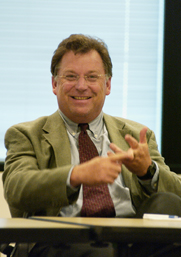 This issue contains many articles that appear, on the surface, to be helpful, process-oriented pieces to help congregations work through issues that arise in the course of their ministries. However, nearly every article can be appended with a BUT—another way to approach the topic addressed in the article. In this way we hope they will generate thought and conversation as much as provide a particular way to approach a specific issue.
This issue contains many articles that appear, on the surface, to be helpful, process-oriented pieces to help congregations work through issues that arise in the course of their ministries. However, nearly every article can be appended with a BUT—another way to approach the topic addressed in the article. In this way we hope they will generate thought and conversation as much as provide a particular way to approach a specific issue.
Take, for example, the long article by Kate Crawford, a copastor of a congregation in the United Church of Canada that engaged in a year-long process to determine whether the church should marry same-sex couples. But, you may say, our congregation would never consider same-sex marriage! Or, same-sex marriage isn’t legal where we are, so it is a different question for us. Or, perhaps, our congregation already performs same-sex marriages. But none of those were the circumstances for Gower Street United Church, and it was going to have to tackle the question. The article shares the year-long process by which the congregation went about finding its answer. One of the most important aspects of the process is that the congregation took the time—a year—to engage the question. There was no rushing, and opportunities were made for everyone to participate. I think there are significant lessons for congregations approaching any difficult decision: take your time, study the question, preach and pray, talk, make room for all, and understand that in the end, although everyone may not agree, no one feels they were not heard.
Or take, as another example, Dorie Clark’s article on church marketing to attract new members. But, you may say, the attractional model of church growth is dead! We are all about doing God’s mission in the world. Or, perhaps, the demographics are against us and we’ll never grow. Or, marketing a church just doesn’t feel right. But Dorie’s article isn’t about appearing to be something that you are not. Rather, it is about knowing who you are, choosing a group of people who will be interested in hearing about that, and figuring out ways to reach them, often through special events that are of interest to them and authentic to your ministry.
Then there’s the article by Rick Danielson on following a long-term pastor that includes a story about a pastor who made his post-retirement home in the congregation he led for many years, and his wife even stayed on as organist. But the conventional wisdom says pastors shouldn’t do that. Or the article by Julie Anne Lytle on using the Internet to “inform, form, and transform” congregational members. “One hour on Sunday is not enough,” the article says, but then describes how even an hour is hard to find many Sundays. Indeed it is, even for those with the best intentions. But, in the face of these changes, here is a way to stay in contact and even enrich the experience of life in community.
Yes, every suggestion can be countered with a response that has the potential to raise questions about its wisdom. But we learn from our experience and that of others, and I’m pleased to share with you this month’s gleanings.
Faithfully,
Richard Bass
